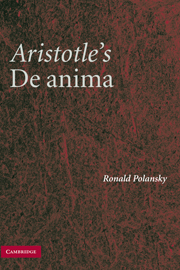Book contents
- Frontmatter
- Contents
- Preface
- List of Abbreviations
- Introduction
- COMMENTARY ON DE ANIMA: : Book 1
- COMMENTARY ON DE ANIMA: Book 2
- COMMENTARY ON DE ANIMA: Book 3
- 1 In the World As It Is There Can Be but the Five Senses
- 2 What Allows for Perceiving That We Perceive; Sense Joins in a Common Power so That the Five Senses Are Subfaculties of a Central Sense Faculty
- 3 Distinguishing Sense and Thought; What Is Phantasia?
- 4 What Is Mind as That Capable of Thinking All Things
- 5 What Enables Thinking to Occur
- 6 The Sorts of Intelligible Objects
- 7 Phantasia Has a Role in All Thinking
- 8 That Mind Can Think All Things
- 9 There Is a Capacity for Progressive Motion
- 10 The Desiderative Capacity Is the Primary Cause of Progressive Motion
- 11 Even the Simplest Animals Have Indefinite Phantasia, and Calculative Phantasia Fits the Account of Progressive Motion
- 12 The Necessary Order of the Faculties of Soul
- 13 The Sort of Body Requisite to Support the Order of the Faculties of Soul
- Bibliography
- Index
2 - What Allows for Perceiving That We Perceive; Sense Joins in a Common Power so That the Five Senses Are Subfaculties of a Central Sense Faculty
Published online by Cambridge University Press: 18 December 2009
- Frontmatter
- Contents
- Preface
- List of Abbreviations
- Introduction
- COMMENTARY ON DE ANIMA: : Book 1
- COMMENTARY ON DE ANIMA: Book 2
- COMMENTARY ON DE ANIMA: Book 3
- 1 In the World As It Is There Can Be but the Five Senses
- 2 What Allows for Perceiving That We Perceive; Sense Joins in a Common Power so That the Five Senses Are Subfaculties of a Central Sense Faculty
- 3 Distinguishing Sense and Thought; What Is Phantasia?
- 4 What Is Mind as That Capable of Thinking All Things
- 5 What Enables Thinking to Occur
- 6 The Sorts of Intelligible Objects
- 7 Phantasia Has a Role in All Thinking
- 8 That Mind Can Think All Things
- 9 There Is a Capacity for Progressive Motion
- 10 The Desiderative Capacity Is the Primary Cause of Progressive Motion
- 11 Even the Simplest Animals Have Indefinite Phantasia, and Calculative Phantasia Fits the Account of Progressive Motion
- 12 The Necessary Order of the Faculties of Soul
- 13 The Sort of Body Requisite to Support the Order of the Faculties of Soul
- Bibliography
- Index
Summary
The opening question of this chapter, whether another sense is needed to explain the way we perceive that we perceive or the sense itself perceives its own perceiving, connects with the previous chapter's argument against more than the five senses. If self-awareness of the senses requires a further sense, there would be more than five. The previous chapter asked whether there is some proper sense for perceiving the common sensibles; Aristotle seems to be asking here whether there is some additional proper sense for perceiving proper perceiving. The previous chapter started to show unification of the senses in some common sense; this unification here receives important verification. If the senses are all united in and working through a central sense, we may say either that a sense perceives itself or that the central sense is aware of sensing, without supposing any senses beyond the five. Unification of the sense power also accounts for perception that goes beyond the proper sensibles to the perception of common and accidental sensibles, and the discrimination of the various proper sensible objects. The chapter's order of treatment is well conceived because the perception of perception with which it begins is presupposed by the discrimination of the sensible objects of different senses with which the chapter ends. The order supports viewing five senses as subfaculties of a common, united sense power, and that sense is thus unified is vital to any adequate understanding of sense.
- Type
- Chapter
- Information
- Aristotle's De AnimaA Critical Commentary, pp. 380 - 402Publisher: Cambridge University PressPrint publication year: 2007



